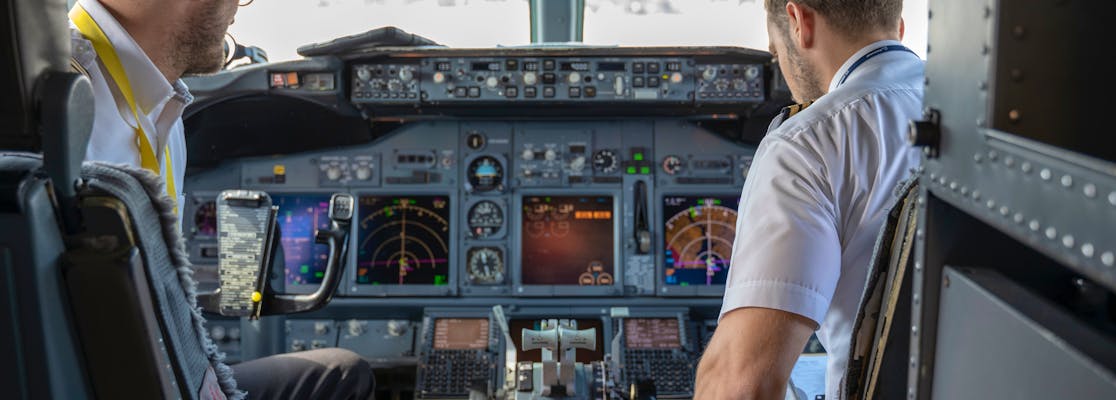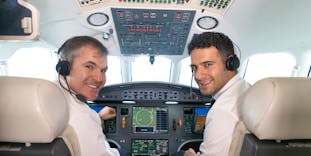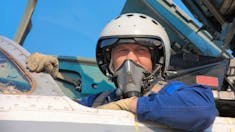How to Pass Pilot Aptitude Tests in 2026
Updated November 5, 2024
- What Is a Pilot Aptitude Test?
- Who Takes the Pilot Aptitude Test?
- Pilot Aptitude Tests - What Skills Are Airlines Looking For?
- What Are the Different Types of Pilot Aptitude Tests?
- Pilot Aptitude Tests Example Questions
- How to Prepare for Your Pilot Aptitude Test in 2026
- Frequently Asked Questions
- Conclusion
If you are looking to become an airline pilot, it is not just your practical skills employers will look out for. You might also be asked to take a pilot aptitude test at the beginning of the interview process for hiring managers to gauge your competencies.
This could include abilities such as cognition, math, language, problem-solving and speed of decision making.
The airline industry is expected to get even bigger within the next 10–20 years, with thousands of new pilots joining, so the hiring process must move with the times when it comes to recruitment.
It is not just your flying ability they are looking at, but several traits and soft skills you will need to be successful.
Even if you are a pro at tests, and usually score quite highly in intelligence-based exams, a pilot aptitude test for commercial or private pilots reveals a pilot’s more natural abilities and personality traits and less so their intellectual competencies.
The airline that you are applying for will have a benchmark you need to meet to be successful and progress to the next stages of the interview process.
Scores and benchmarks for the pilot aptitude test will be detailed later within this article, as well as the test’s format and some sample questions.
What Is a Pilot Aptitude Test?
In brief, a pilot aptitude test is a quick way for airline recruiters to sift through many applications for the same role.
Hiring managers can eliminate candidates that might not reach their benchmark before taking them through to the next stage.
This is not only an efficient way for the employer to work, but it also ensures the candidate does not waste any time on a lengthy interview process only to be unsuccessful.
Who Takes the Pilot Aptitude Test?
If you already have an advanced skill set when it comes to flying and overall flight knowledge, the pilot aptitude test will not investigate these skills. It is testing your cognitive abilities, potential and how well you might work in a pressured environment.
The pilot aptitude test can be used for commercial airline pilots, RAF, cadet recruitment and even freight pilots.
Being a pilot is challenging, so it is no surprise that an aptitude test designed specifically for pilots can be difficult.
Each test contains a series of puzzles, logic questions and quick-thinking conundrums that you might never have had to answer before.
As a pilot, you are tasked with a lot of responsibility, and you could potentially find yourself in a situation where you might have to make important decisions at speed.
This is what the pilot aptitude test measures. So, if you are looking to join the RAF or become a commercial pilot, it is a good idea to get prepared, even if you are not a fan of exams.
Practice Pilot Aptitude Test with JobTestPrep
Pilot Aptitude Tests - What Skills Are Airlines Looking For?
Airlines look for a range of skills in their pilots, from numeracy to spatial reasoning.
Each airline uses different criteria, but the main things hiring managers will want mostly remain the same.
Here are some skills passing a pilot aptitude test requires:
-
Multitasking – A pilot’s job contains a lot of multitasking. Whether handling the plane while instructing staff, or planning a route whilst waiting for updates, multitasking is a key skill for a pilot.
-
Working under pressure – Flying can come with a lot of pressure. Pilots must work to set schedules while dealing with varying weather conditions, delays and other factors (depending on the type of pilot). So, working well under pressure is a key attribute that airlines look for.
-
Reasoning – Reasoning questions measure a candidate’s problem-solving skills and ability to use structured thinking. They can show themselves in different ways, for example as a statement you must complete or something based on logic.
-
Spatial and situational awareness – For a pilot, spatial awareness is an obviously necessary skill, but how these types of questions present themselves can be tricky to decipher. For instance, you might receive a set of icons like cubes or mirrored reflections that you have to mentally rotate.
-
Literacy – Even though there is much practical work involved in being a pilot, you will also have to write flight plans and reports, amongst other things. So, your literacy skills need to be on par if you want to become a pilot. There will be some language questions in the pilot aptitude test to assess your literacy competencies.
-
Numeracy – As with literacy, you will be provided with some numerical questions to test your math skills and ability to work with numbers. This is because pilots must be able to determine information such as speed, mileage and flight trajectory on the fly.
-
Mental arithmetic – You cannot use a calculator during a pilot aptitude test, as calculations when flying a plane must often be done quickly and in your head.
-
Psychomotor – You need to have good psychomotor skills to operate any machinery, whether it be driving a car or flying a plane. You will be tested to see how quick your reflexes are as well as your hand-eye coordination.
-
Aviation knowledge – If you are taking an advanced COMPASS pilot aptitude test, then your aviation experience will definitely come in handy. If you are just training to be a pilot, now is the time to test your aviation knowledge before the final exam.
There are, of course, other cognitive skills needed to become a pilot, as well as the obvious practical skills you might already have acquired.
What Are the Different Types of Pilot Aptitude Tests?
There are a few variations of the pilot aptitude test. Here are a few of the aptitude tests you might see if you are applying for a pilot’s role:
-
COMPASS pilot aptitude test – The COMputerized Pilot Aptitude Screening System aptitude test is used worldwide by a selection of well-known airlines and flight schools. This screening system comprises six individual tests, assessing a pilot’s hand-eye coordination as well as the skills listed above. Since its introduction in the '90s, the COMPASS pilot aptitude test battery has been taken by thousands of candidates worldwide and has been recommended by the EPST.
-
Advanced COMPASS – As with the original COMPASS test, there is an advanced version that more qualified pilots take if they are looking to get a higher-ranking job within the same airline. This test can be harder than the original, but this will depend on what position you are applying for. The advanced test is for licensed pilots and consists of eight individual tests.
-
PILAPT – This is another type of cognitive ability test used by a variety of airlines and flight schools to assess talent at the beginning of the process. The PILAPT has been around since 1997 and has been used by both the military and commercial aviation industry. As it is used worldwide, the test comes in all different languages and is a popular method of assessment amongst pilots.
-
CUT-E – A lot of recognized brands around the world use these tests, including, Norwegian Air, Aer Lingus and EasyJet. CUT-E tests are a bit newer than some of the others and have been around since the early 2000s. They are designed to be taken online, which is a cost- and time-saving measure. The CUT-E tests are a big part of the recruitment process.
-
DLR BU/GR – Used by the likes of Cargolux, Turkish Airlines, Lufthansa, Kuwait Airways, SunExpress and Luxair, the DLR BU/GR test is another common pilot aptitude test. The test program was constructed for both trained and fresh pilots and features six DLR modules. In training mode, you can set the timer manually and restart questions.
-
Talent Q – Mainly used by Qatar Airways, Talent Q tests have been around since 2006. They feature psychometric questions to assess candidates on numerical reasoning, spatial awareness, logic and more.
If you need to prepare for a number of different employment tests and want to outsmart the competition, choose a Premium Membership from JobTestPrep.
You will get access to three PrepPacks of your choice, from a database that covers all the major test providers and employers and tailored profession packs.
Pilot Aptitude Tests Example Questions
Here are some example questions you could get on your pilot aptitude test battery.
How to Prepare for Your Pilot Aptitude Test in 2026
As for many tests, preparation is key when it comes to a pilot aptitude test. As the exam is one of the key elements for getting through to the next stage of the recruitment process, it is important to do your homework.
Here are a few things you can do to prepare:
Step 1. Use Online Testing Platforms
The best way to prep for a test is to do several practice runs.
There are many platforms out there that offer sample tests to help you get used to the format of the test and see the type of questions you might receive.
Check out sites like JobTestPrep for sample tests.
Step 2. Practice to Be Perfect
When you are doing practice pilot aptitude tests, take note of the areas you might not be fully competent in.
For instance, if you have taken a few sample tests and do less well at the numeracy questions, then it is in your best interest to brush up on these skills.
Try taking daily numeracy tests and reading helpful guides.
Step 3. Play Brain-Training Games
There are many games and apps out there that can help stimulate your brain and prepare it for quick thinking and spatial reasoning questions.
Step 4. Practice Logical Thinking
There will most definitely be problem-solving questions on the test, so it is in your favor to particularly expand your logical thinking skills.
Step 5. Stress Management Challenges
Stress management is both about reducing the overall stress in your life and increasing your tolerance for stressful situations.
Look for activities that can help increase your stress tolerance, such as physical exercises at the gym or scenarios you set yourself to problem solve in a stressful environment.
Deliberately put yourself under pressure but make it fun! Get a friend to set you some playful tasks under a time limit and see how you do. This will make you more resilient to the stress of the time-limited pilot aptitude test.
Step 6. Get Good Sleep
In the time before the test, develop a stable bedtime routine that ideally gives you an hour to wind down without screens before sleep and lets you get six to eight hours sleep a night.
Particularly make sure you get plenty of sleep before the exam so you are well-rested and can do the pilot aptitude test with fresh eyes.
Step 7. Pen and Paper at the Ready
You cannot use a calculator during the test, but you will be able to show workings out on a paper.
Have this ready and waiting next to you before you begin so you are not scrambling to find it while the timer is running.
Step 8. Find Out What Testing Platform Is Being Used
You should be able to ask the hiring manager what platform they intend to use for the test. This means that you can investigate the formatting and requirements for the specific platform and ensure you have everything necessary.
Prepare for a Pilot Aptitude Test
The Pilot Aptitude Test is a pre-employment screening test that is used both for experienced pilots and for those that are heading for initial pilot training.
The assessment is usually comprised of a battery of tests that evaluate competencies, skills, and aptitudes beyond the ability to fly.
In most cases, you will need to pass the pilot aptitude test before you will be invited to take part in pilot training.
If you don’t pass the aptitude test you are not likely to be taken further in the process.
- Cognition – this covers mechanical comprehension of basic physics principles, as well as verbal and numerical reasoning
- Psychomotor – hand-eye coordination and multitasking
- Aviation knowledge – aerodynamics and instruments of an aircraft
The questions might have different formats throughout the battery – multiple choice for most, but some will have a completely different structure. For example, the psychomotor assessment usually takes place as a game to be played with a joystick.
There are several different publishers of pilot aptitude tests, including:
- COMPASS/Advanced COMPASS
- PILAPT
- Cut-E
- DLR BU/GR
- Talent Q
If you are not sure of the publisher, or you want to take a wider range of practice tests, then JobTestPrep has a wealth of resources available to you.
To be a good screening assessment, the pilot aptitude test needs to be challenging. It is used to ensure that the applicants have all the skills, aptitudes and competencies that are needed to be successful in the future.
You will be put under exam pressure, whether you take the test online in your own time or at an assessment center.
As the pilot aptitude test is an integral part of the recruitment process for becoming a pilot and for joining a pilot training program, if you fail the test, it is not likely that your application will be taken further.
The pilot aptitude test can be taken in one of two ways – either online in your own time or at an assessment center.
In both cases, you will need to know how to perform basic functions on a computer.
If you fail or do not reach the required score, your application will be rejected and you will not be taken further in the recruitment process.
However, in some cases, you might be allowed to reapply for the role in the future, after a short waiting period. This means that you would also be able to retake the pilot aptitude test.
For an all-around experience that is designed to give you the best chance to succeed, the resources at JobTestPrep are perfect.
From free practice tests to paid-for Prep Packs, the content at JobTestPrep is carefully curated to give candidates the knowledge and skills they need to ace the test and nail that perfect role.
Some of the flight simulation games are well-known for their realism, so they are a good start. They aren’t necessarily going to help your motor skills, but they will help you with multitasking and using different cockpit instruments.
For the most part, the psychomotor tests are looking for hand-eye coordination, so any PC game that needs fast reactions will help. Even games as basic as Space Invaders are perfect for this.
Being a good pilot is more than having flying skills – there are a lot of competencies and aptitudes that go towards making a brilliant pilot. These include:
- Clear communication
- Leadership and teamwork skills
- Calm under pressure
- Technologically aware
- Situational awareness
- Confidence
- Good judgment
- Decisiveness
- Mentally and physically healthy
- Intelligent
- Self-sufficient
- Quick thinking and adaptable
- Analytical
Conclusion
Becoming a pilot is a sought-after position as they can earn a six-figure salary.
More and more candidates are applying for the roles available within the aviation industry.
If this industry is calling you, then you must ensure you are fully prepared for all that the pilot recruitment process might require of you, which will include some form of psychometric-based aptitude test.
If you have asked the right questions before the test and have brushed up on all the necessary competencies, then taking the test should not be a problem. The more prep you do, the higher you will score.





